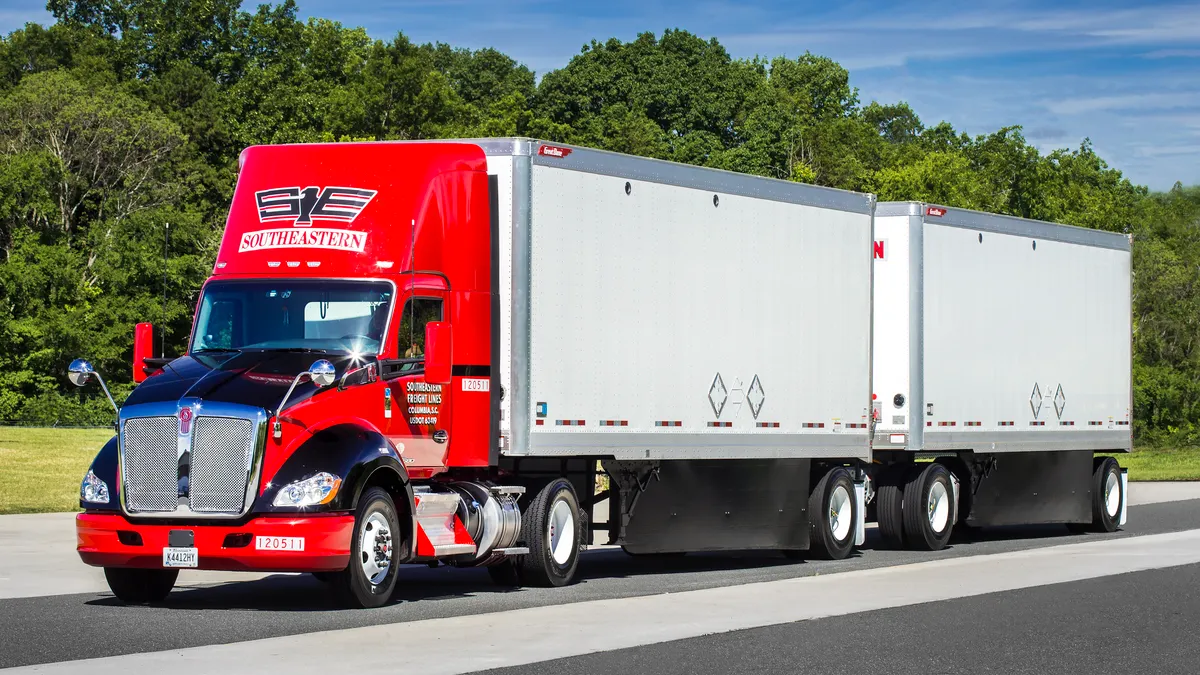This is an opinion piece by Kenneth A. Rosen, Mary E. Seymour and Philip J. Gross of Lowenstein Sandler LLP. The views expressed herein are those of the authors. Views do not necessarily reflect those of Transport Dive, and are not necessarily shared by other persons at Lowenstein Sandler LLP or by clients of the firm. Each case is unique. The law is subject to interpretation. This article is not intended to provide legal advice.
For the trucking industry, problems in 2019 stemming from U.S./China trade tensions look small when compared with the damage caused by COVID-19. Tens of thousands of truckers are out of work.
So, industry executives should get familiar with the nuances of the reorganization chapter of the Bankruptcy Code. Chapter 11 is intended to enable companies to restructure debts and to reorganize and revitalize their businesses. But preplanning and speed are key.
For a trucking company facing Chapter 11, here are some important tips and best practices.
Negotiating before filing
Chapter 11 cases rarely get better with age, and debtors should negotiate with as many key players as possible prior to bankruptcy — including shareholders, lenders, lessors, landlords and unions.
Well in advance of the petition, companies should talk with their banks about the use of cash collateral (proceeds of accounts receivable). The bank may require the debtor to:
- Commence a sale of the business.
- Comply with an agreed-upon budget and could ask for additional collateral.
These issues should be resolved pre-bankruptcy, so the debtor can announce that it has successfully obtained financing to continue operating — thereby calming fears of customers, creditors and employees.
Chapter 11 cases rarely get better with age, and debtors should negotiate with as many key players as possible prior to bankruptcy — including shareholders, lenders, lessors, landlords and unions.

Chapter 11 also permits debtors to reject (i.e., disavow/terminate) burdensome leases and contracts. All leases and contracts should be analyzed before filing, as a motion to reject them can be submitted immediately after filing. Negotiating for better lease or contract terms should also occur before filing to determine whether improved terms and pricing justify retaining the lease or contract.
The bankruptcy code also permits debtors to reject collective bargaining agreements (CBA) and/or modify retiree benefit obligations — though the burden of proof is high. Resolving these issues before the onset of Chapter 11 can avoid a protracted and expensive court battle, particularly with unions.
Constant communications
If drivers are caught off guard by a Chapter 11 filing and think that they will not be paid, some might abandon trucks and/or trailers at random locations. Customers also might panic if they think goods won’t be delivered or if they don’t get updates. Maybe more importantly, companies shouldn’t count on lay people to know the difference between Chapter 11 (reorganization) and Chapter 7 (liquidation).
Before Chapter 11 commencement, a debtor should assemble contact information for drivers and keep them informed, assuring them that they will be paid normally. Keeping customers updated about their goods is also crucial.
Communication is important in other ways, as well. Under Section 363 of the bankruptcy code, judges can permit companies in Chapter 11 to sell assets “free and clear” of liens, creditor claims and any other encumbrances. Purchases should be negotiated before the filing and applications of sale should be filed with the bankruptcy court to approve the sale when the case commences. This enables debtor management to assure customers and employees — with credibility — that Chapter 11 is a restructuring and that there will be no impact on day-to-day operations.
Debtors should have a press release ready that praises purchasers, describing benefits to employees and customers, and discussing the financial strength of the buyer as well as anticipated synergies.
Keeping customers (and vendors)
Customers often will say they will stick with a particular trucking company through thick and thin, even while lining up other options. In a highly competitive sector like trucking, customers have many options.
So, communications after filings are also critical. Every positive outcome — no matter how small — should be widely reported to customers (and to employees and creditors). This includes obtaining financing, termination of burdensome leases and contracts, obtaining a new customer, etc.
It’s also important to maintain relationships with critical vendors. Those owed money pre-bankruptcy might refuse to do business with a debtor after the filing. That’s why a budget should be prepared to pay those vendors after a case commences. Critical vendors should also be alerted to the bankruptcy before it commences and assured of payment.
Finally, coordinating with interline shippers is essential to prevent delays. They might have to be treated as critical vendors if they can hold shipments — otherwise, they should be brought current immediately before the petition date.
Dealing with lenders and other considerations
A principal benefit of Chapter 11 is that a lender can obtain a federal court order authorizing financing and decreeing the status and priority of a loan before it is actually made. That avoids creditor challenges and gives lenders, especially insiders, comfort that may not be possible outside of court.
Debtors should also review the collateral they give lenders. Titles to all vehicles must be located and centralized and debtors should not assume lenders fully grasp all the assets under "blanket" liens. It’s important to verify that the lender has properly documented and recorded security interests, as possession of title is required for some assets. Debtors should also ensure that Uniform Commercial Code financing statements have not expired, and conduct a lien search to find assets on which the lender does not have a security interest. Those can be used to obtain additional financing.
Finally, it’s important to remember that cash is king.

If the debtor’s intent in Chapter 11 is to shut down the business and liquidate the assets, it should corral trucks and trailers in one or more secure and central locations shortly before the petition is filed. Also, new freight should not be picked up. Additionally, debtors should identify and retain an experienced auctioneer and find out where equipment should be brought to be prepared for auctions. All truck leases should be examined to determine whether they are actually secured transactions that could be sold at auction.
Finally, it’s important to remember that cash is king. When a debtor knows the anticipated Chapter 11 commencement date, it should consult with counsel and financial advisors regarding what obligations to stop paying to build up cash.
A well-planned Chapter 11 enables a debtor to publicize that the bankruptcy case is a tool for reorganization, that the pieces necessary for success are in place, and that the proceedings will move quickly and successfully. In difficult times, this gives customers, salespeople and employees the comfort that they need.


















